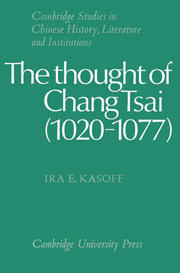Crossref Citations
This Book has been
cited by the following publications. This list is generated based on data provided by Crossref.
Cullen, Christopher
1990.
The science/technology interface in seventeenth-century China: Song Yingxing on qi and the wu xing.
Bulletin of the School of Oriental and African Studies,
Vol. 53,
Issue. 2,
p.
295.
Gardner, Daniel K.
1991.
Modes of Thinking and Modes of Discourse in the Sung: Some Thoughts on theYü-lu(“Recorded Conversations”) Texts.
The Journal of Asian Studies,
Vol. 50,
Issue. 3,
p.
574.
Wright, David
1994.
Tan Sitong and the ether reconsidered.
Bulletin of the School of Oriental and African Studies,
Vol. 57,
Issue. 3,
p.
551.
Wang, Robin R.
and
Weixiang, Ding
2010.
Dao Companion to Neo-Confucian Philosophy.
Vol. 1,
Issue. ,
p.
39.
Liou, Ching-Ping
and
Prior, Seamus
2012.
Taiwanese senior counsellors’ ch'i-related experiences and their counselling practice.
Asia Pacific Journal of Counselling and Psychotherapy,
Vol. 3,
Issue. 1,
p.
18.
Patt-Shamir, Galia
2012.
Filial Piety, Vital Power, and a Moral Sense of Immortality in Zhang Zai’s Philosophy.
Dao,
Vol. 11,
Issue. 2,
p.
223.
Wilds, Richard P.
2014.
Biographical Encyclopedia of Astronomers.
p.
2425.
Henderson, John B.
and
Ng, On-Cho
2014.
Dao Companion to the Analects.
Vol. 4,
Issue. ,
p.
37.
Brasovan, Nicholas S.
2015.
Aesthetics of Qi: Building on the Internalist-Essentialist Philosophy of Art.
Dao,
Vol. 14,
Issue. 1,
p.
75.
Chaffee, John W.
and
Twitchett, Denis
2015.
The Cambridge History of China.
Peterson, Willard J.
2016.
The Cambridge History of China.
2017.
Neo‐Confucianism.
p.
285.
Matthews, Michael R.
2019.
Feng Shui: Teaching About Science and Pseudoscience.
p.
43.
Wang, Jing
2019.
Throbbing crowds: Of dancing grannies and acoustic milieus in contemporary China.
Social Science Information,
Vol. 58,
Issue. 2,
p.
377.
Friedrich, Michael
2020.
Kindlers Literatur Lexikon (KLL).
p.
1.
Thompson, Kirill O.
2020.
Dao Companion to ZHU Xi’s Philosophy.
Vol. 13,
Issue. ,
p.
929.
Angle, Stephen C.
and
Tiwald, Justin
2020.
Dao Companion to ZHU Xi’s Philosophy.
Vol. 13,
Issue. ,
p.
361.
Lee, Junghwan
2020.
Dao Companion to ZHU Xi’s Philosophy.
Vol. 13,
Issue. ,
p.
265.
You, Mi
2021.
Visual Culture Wars at the Borders of Contemporary China.
p.
131.
Costantini, Filippo
2021.
Zhang Zai, <em>Zhengmeng</em>.
Estudios de Asia y África,
Vol. 57,
Issue. 1,
p.
151.





